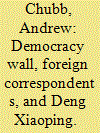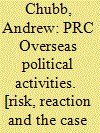|
|
|
Sort Order |
|
|
|
Items / Page
|
|
|
|
|
|
|
| Srl | Item |
| 1 |
ID:
167507


|
|
|
|
|
| Summary/Abstract |
English-language analysis of Chinese foreign policy has often cited nationalist public opinion as a key driver of Beijing’s recent assertive maritime conduct. Yet these important conjectures have not been systematically tested. How can we know whether public opinion has been driving an authoritarian state’s foreign policy? What are some cases in which concern about popular nationalism may have influenced Beijing’s behavior in disputed maritime spaces? To answer these questions, this article constructs a methodological framework for assessing the likely impact of public opinion on particular instances of state action. Applying this to five cases typical of China’s on-water policy in the South and East China Seas since 2007 indicates that popular nationalism has had little to do with China’s assertive turn on its maritime periphery.
|
|
|
|
|
|
|
|
|
|
|
|
|
|
|
|
| 2 |
ID:
137452


|
|
|
|
|
| Summary/Abstract |
This article focuses on the broad spread of shanzhai culture in 2008, exploring the central question: what is it that brings such disparate phenomena together under one label? Shanzhai things have typically emerged from new spaces for participation in production beyond the control of formerly monopolistic authorities. But things are not necessarily shanzhai by birth, for it is also an identity affixed to things by consumers. The shanzhai identity's inherent ambiguity—almost the same but not quite—brings with it a dimension of disruption of authority (cf. Bhabha), but its political standpoints are elusive. Using insights from hybridity theory, this article characterizes shanzhai as a contemporary successor to what Lu Xun termed Grabism: the active reappropriation of economic and cultural authority for diverse local purposes, which have themselves been shaped and redefined by those same authorities.
|
|
|
|
|
|
|
|
|
|
|
|
|
|
|
|
| 3 |
ID:
149179


|
|
|
|
|
| Summary/Abstract |
This article identifies and explains the role of the Western media in Chinese politics between November 1978 and April 1979, when the rise of Deng Xiaoping within the Communist Party coincided with the emergence of the Democracy Wall free speech movement on China’s streets, and the normalization of Sino-American relations. At this critical juncture in twentieth-century history, foreign journalists in Beijing were much more than simply gatekeepers of a conduit to the outside world. Chinese activists believed that, through the Western media, they could reach domestic audiences in China, and potentially even the Party leadership. Indeed, foreign reporting contributed to the movement’s spread to issue_image_89_3_Foreign Correspondents China - EA Photo2other parts of the country, while strengthening and accentuating its most radical aspects. However, the main beneficiary of these interactions was Deng, who enlisted Democracy Wall and the foreign media, at times in conjunction, to advance his domestic and international objectives. Once he had secured control of the Party’s political direction, and the normalization of Sino-American relations, the foreign press provided the rationale, if not the impetus, for the movement’s suppression. Drawing on participant interviews, new Chinese sources, and analysis of press archives, this article brings important new insights into the momentous political events that set in motion the ongoing transformation of China and the region. It also illuminates the little-studied role of international media in producing “radical flank effects” that can help or hinder both social movements and state authorities. The case stands as a cautionary example for social activists attempting to harness the power of international media today.
|
|
|
|
|
|
|
|
|
|
|
|
|
|
|
|
| 4 |
ID:
176511


|
|
|
|
|
| Summary/Abstract |
Why has the People's Republic of China (PRC) courted international opprobrium, alarmed its neighbors, and risked military conflict in pursuit of its claims over vast areas of the South China Sea? Answering this question depends on recognizing long-term patterns of continuity and change in the PRC's policy. A new typology of “assertive” state behaviors in maritime and territorial disputes, and original time-series events data covering the period from 1970 to 2015, shows that the key policy change—China's rapid administrative buildup and introduction of regular coercive behaviors—occurred in 2007, between two and five years earlier than most analysis has supposed. This finding disconfirms three common explanations for Beijing's assertive turn in maritime Asia: the Global Financial Crisis, domestic legitimacy issues, and the ascendancy of Xi Jinping. Focused qualitative case studies of four breakpoints identified in the data indicate that PRC policy shifts in 1973, 1987, and 1992 were largely opportunistic responses to favorable geopolitical circumstances. In contrast, the policy change observed from 2007 was a lagged effect of decisions taken in the 1990s to build specific capabilities designed to realize strategic objectives that emerged in the 1970s.
|
|
|
|
|
|
|
|
|
|
|
|
|
|
|
|
| 5 |
ID:
180276


|
|
|
|
|
| Publication |
Abingdon, Taylor and Francis, 2021.
|
| Description |
v, 97p.pbk
|
| Standard Number |
9781032152073
|
|
|
|
|
|
|
|
|
|
|
|
Copies: C:1/I:0,R:0,Q:0
Circulation
| Accession# | Call# | Current Location | Status | Policy | Location |
| 060047 | 327.51094/CHU 060047 | Main | On Shelf | General | |
|
|
|
|
| 6 |
ID:
191870


|
|
|
|
|
| Summary/Abstract |
This article traces the emergence of ‘Chinese influence’ as a conceptual touchstone of Australia’s public policy discourse in 2017–2018. The People’s Republic of China’s (PRC) efforts to influence politics abroad had been well documented since the 2000s and cannot explain the timing of their securitization from mid-2017. It was through the formation of a securitizing coalition of intelligence officials, politicians, and journalists that the PRC as a source of existential threats gained policy traction. But as the coalition expanded from security agencies to politicians and the media, the scope of the threat expanded from an initial concern with PRC party-state activity to the securitization of a much wider array of state and non-state activities under the ambiguous label ‘Chinese influence’.
|
|
|
|
|
|
|
|
|
|
|
|
|
|
|
|
|
|
|
|
|